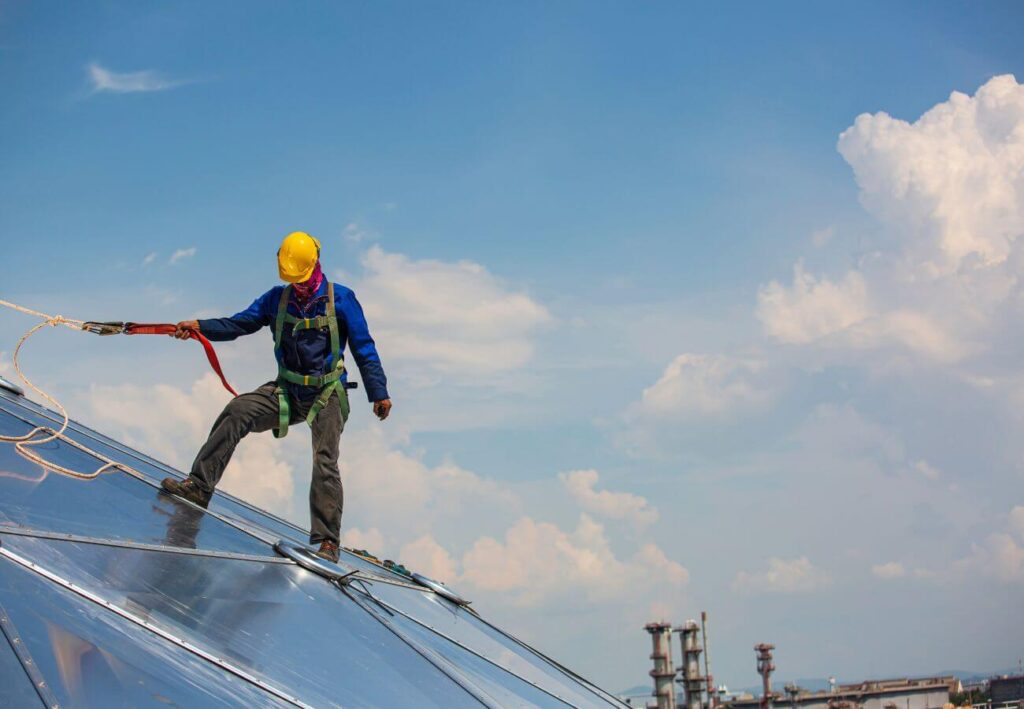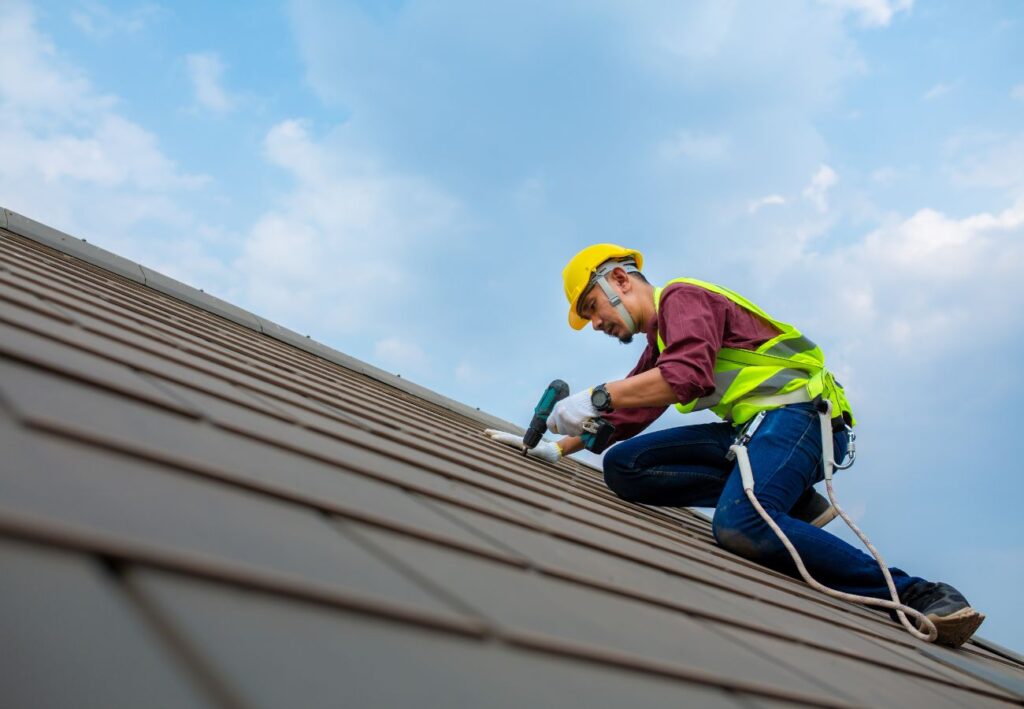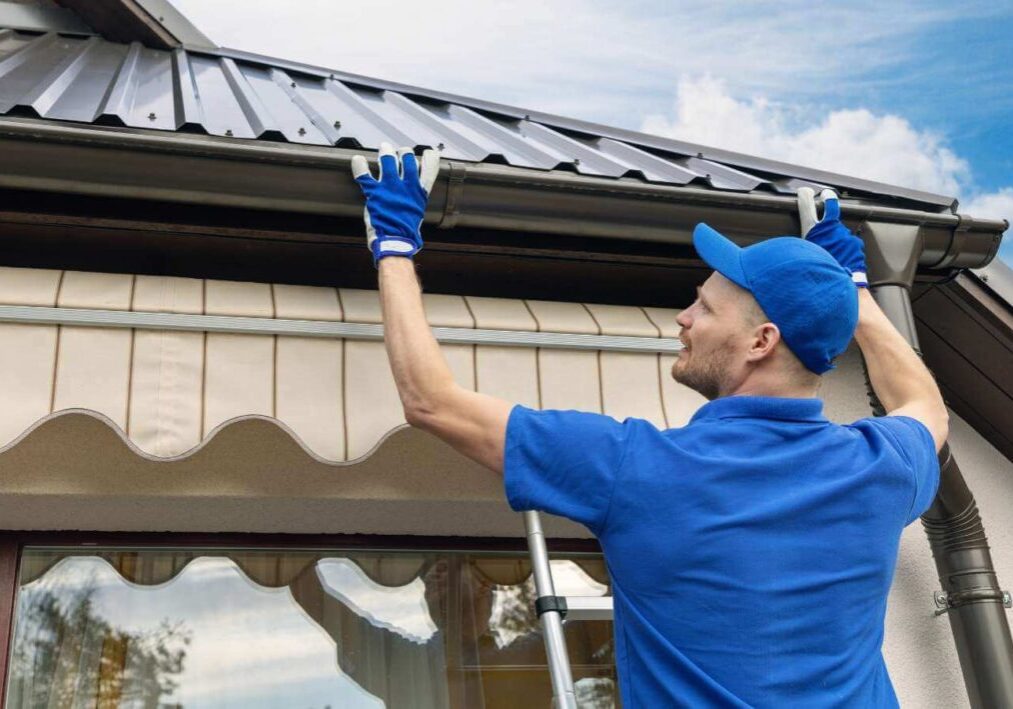Roofing projects, whether residential or commercial, are essential to maintaining the longevity and structural integrity of a building. However, they also come with inherent risks due to the nature of working at heights, handling heavy materials, and dealing with unpredictable weather conditions. Implementing strict roofing safety protocols is critical to prevent accidents and ensure the well-being of workers and property owners. This guide provides practical steps for preventing accidents during roofing projects, covering safety measures, equipment use, and how to work with a trusted roofing company like All Weather Roofing.
If you’re planning residential roofing or commercial roofing projects in Stockton, All Weather Roofing offers expert services with a focus on safety and quality.
The Importance of Roofing Safety
Roofing projects require precise execution and a thorough understanding of safety protocols to avoid potentially dangerous accidents. Injuries resulting from falls, equipment misuse, and improper safety gear are among the most common hazards faced by roofers. For both DIY enthusiasts and professional roofers, adhering to roofing safety guidelines is essential.
Some of the most common risks associated with roofing work include:
- Falls from Heights: The leading cause of injuries in roofing projects, falls can result from unstable surfaces, lack of guardrails, or improper use of safety harnesses.
- Weather Conditions: Wind, rain, and extreme temperatures can make roofing work more dangerous and increase the risk of slipping or falling.
- Equipment Misuse: Improper use of tools like nail guns or ladders can lead to serious injuries.
- Roof Collapses: If the roof is structurally unsound, workers may be at risk of falling through the roof.
- Electrical Hazards: Working near power lines or electrical equipment on a roof can increase the risk of electrocution.
Addressing these hazards requires a comprehensive approach to roofing maintenance and safety planning.

Step-by-Step Safety Protocol for Roofing Projects
To prevent accidents and ensure a smooth roofing project, follow these essential safety tips:
1. Use Proper Safety Gear
One of the simplest yet most effective ways to prevent injuries is by wearing appropriate safety gear. This includes:
- Hard Hats: Protect workers from head injuries caused by falling objects or accidental bumps.
- Safety Harnesses: When working at heights, all workers should wear harnesses that are securely anchored to a stable point.
- Non-Slip Footwear: Proper footwear with good traction can help prevent slips and falls.
- Safety Glasses and Gloves: Protect the eyes from debris and hands from cuts and scrapes.
Ensuring that all workers are outfitted with the right safety gear before starting the job is key to minimizing the risk of injury.
2. Conduct Pre-Project Roofing Inspections
Before starting any roofing project, it’s crucial to conduct a thorough inspection of the roof. A roofing inspection helps identify potential hazards, such as weak spots, structural issues, or obstacles that could interfere with safety measures. Inspecting the roof also allows for planning the proper setup of scaffolding, guardrails, and other protective systems.
At All Weather Roofing, we provide detailed roofing inspections in Stockton to assess your roof’s condition and determine the best course of action for repairs or replacements.
3. Ensure Proper Ladder Safety
Many roofing accidents occur due to improper use of ladders. Always make sure that:
- Ladders Are Secure: Position ladders on stable, even ground and anchor them securely to the roof edge.
- Follow the 4:1 Rule: For every four feet in ladder height, the base should be one foot away from the wall to ensure stability.
- Never Overreach: Keep your body centered between the ladder rails to avoid losing balance and falling.
Ladder safety can prevent falls and injuries while accessing the roof, ensuring a safer working environment.
4. Use Fall Protection Systems
For roofing projects that require working at heights, using a fall protection system is critical. This can include:
- Guardrails: Installing guardrails around the perimeter of the roof creates a barrier that prevents workers from falling.
- Safety Nets: These can be placed under the roof to catch workers in case of a fall.
- Personal Fall Arrest Systems (PFAS): These include harnesses, lanyards, and anchors that are used to prevent workers from hitting the ground if they fall.
Implementing these systems reduces the risk of falls, one of the most common causes of injury in roofing projects.
5. Monitor Weather Conditions
Weather can have a significant impact on the safety of a roofing project. Wind, rain, and snow can create hazardous conditions, making surfaces slippery and increasing the risk of falls. Before starting work, check the weather forecast and avoid working in extreme conditions.
In Stockton, where temperatures can fluctuate, it’s important to schedule roofing work during favorable weather to ensure safety.
6. Secure Tools and Materials
Loose tools and materials on the roof can create tripping hazards and increase the risk of objects falling off the roof. Always ensure that:
- Tools Are Properly Secured: Use tool belts or secured storage areas to keep tools organized and prevent them from rolling off the roof.
- Materials Are Stacked Securely: Keep materials like shingles or tarps secured to prevent them from being blown off by the wind.
Organizing tools and materials also improves productivity, reducing downtime and minimizing the chance of accidents.
7. Implement Training Programs
Proper training is essential for anyone working on a roofing project. All workers should receive training on:
- Roofing Safety Protocols: This includes ladder safety, fall protection, and the use of personal protective equipment (PPE).
- Tool and Equipment Use: Workers should be familiar with the proper use of all tools, including nail guns, ladders, and scaffolding.
- Emergency Procedures: In case of an accident, workers should know the proper response, including first aid, calling emergency services, and evacuating the area.
At All Weather Roofing, we prioritize the safety of our workers by providing comprehensive training on the best safety practices for residential roofing and commercial roofing projects.
8. Work with a Trusted Roofing Company
One of the best ways to ensure a safe roofing project is by working with a trusted roofing company like All Weather Roofing. Experienced roofing professionals are familiar with safety protocols and have the right equipment to get the job done safely and efficiently.
Hiring a professional roofing company can also reduce the risk of accidents since they have the expertise to handle unexpected issues like unstable structures or hazardous conditions.

Common Safety Mistakes to Avoid in Roofing Projects
While following the above steps can help prevent accidents, there are some common safety mistakes that both homeowners and contractors should avoid:
- Skipping the Pre-Project Inspection: Failing to conduct an inspection can result in missed hazards and structural weaknesses that could lead to accidents.
- Ignoring Safety Gear: Not using proper safety gear, such as harnesses and helmets, increases the likelihood of injury.
- Neglecting Ladder Safety: Overreaching or using an unsecured ladder can lead to falls.
- Rushing the Job: Trying to complete a project too quickly can result in accidents due to carelessness or overlooking safety procedures.
By avoiding these mistakes, you can significantly reduce the risk of accidents during your roofing project.
Benefits of Partnering with All Weather Roofing
When it comes to ensuring both safety and quality in residential roofing and commercial roofing projects, All Weather Roofing is the go-to choice in Stockton. Here’s why:
- Experience and Expertise: With years of experience in roofing Stockton, we have a deep understanding of the best safety practices, ensuring that every project is completed without accidents.
- Thorough Inspections: We perform detailed roofing inspections Stockton to assess the condition of your roof and identify potential hazards before beginning any work.
- Comprehensive Services: From roof repair Stockton to full-scale replacements, we offer a wide range of services tailored to meet your needs.
- Trained Professionals: Our team is fully trained in the latest safety protocols, and we invest in regular training to ensure compliance with industry standards.
- Trustworthy and Reliable: As a trusted roofing company Stockton, we prioritize safety and customer satisfaction, ensuring that each project is completed with precision and care.
Conclusion
Roofing projects come with inherent risks, but by following the right safety protocols and working with experienced professionals, these risks can be significantly reduced. From conducting pre-project roofing inspections to wearing proper safety gear and securing tools, each step is crucial in preventing accidents and ensuring the success of the project.
For safe, reliable, and professional roofing maintenance and roof repair services in Stockton, turn to All Weather Roofing. Our commitment to safety and quality ensures that your roofing project will be completed without incident, providing you with peace of mind and long-lasting results.
Contact All Weather Roofing today for all your residential roofing and commercial roofing needs in Stockton!
Share this post:



